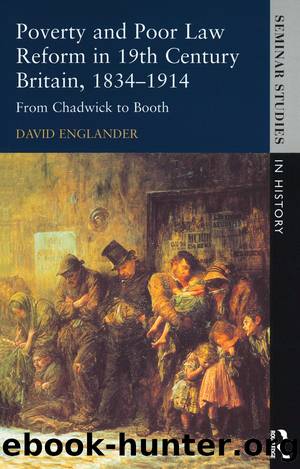Poverty and Poor Law Reform in Nineteenth-Century Britain, 1834-1914: From Chadwick to Booth (Seminar Studies) by David Englander

Author:David Englander [Englander, David]
Language: eng
Format: epub
Tags: History
ISBN: 9780582315549
Goodreads: 19808195
Publisher: Routledge
Published: 1998-06-11T00:00:00+00:00
Part Three: Assessment
6 Problems and Prospects
Historians and the Poor Law
Poor law ideals formed part of the mentality of the middle classes. The principles of 1834 with their distinctive social imagery and assumptions about the nature and purpose of public action rapidly became part of the intellectual baggage of Victorian Britain. The New Poor Law in this perspective was more than a matter of administrative reform. W. N. Molesworth (1816â1890), author of the bestselling History of England from 1830â1874, wrote of it as an act of deliverance from insolvency and insurrection and a defining moment in the formation of the age of progress. Poor law reform, in his account, was identified with the movement from darkness and disorder towards virtue and enlightenment. The Old Poor Law was associated with national ruin; the New Poor Law with national improvement. Under the Old Poor Law the poor were out of control; under the New they were properly regulated. Chadwick thus deserved well of his countrymen. Extravagance had been checked and order restored. Fears of a descent into the chaos and confusion of the unreformed era, which revived whenever the economy faltered or unforeseen emergency put pressure on local expenditure, underscored the seminal and uplifting character of the legislation of 1834.
Modern historians take a different view. Today the principles of 1834 have few defenders. There is no reputable historian who regards them as praiseworthy or progressive. The consensus is that the Poor Laws were an egregious error, a ghastly mistake, and a dark phase in the development of social policy. R. H. Tawney (1880â1962) criticized the Report of the Royal Commission of 1834 as âwildly unhistoricalâ [156 p. 269], to which Mark Blaug added the claim that it was also âwildly unstatisticalâ [36 p. 152], E. P. Thompson (1924â1993?) called it âthe most sustained attempt to impose an ideological dogma, in defiance of the evidence of human need, in English historyâ [157 p. 267]. The commissioners, it is often said, were crude ideologues, who had made up their mind in advance of the evidence. No attempt to analyse the causes and nature of poverty was undertaken. Problems arising from structural economic change were passed through the distorting lens of political economy. Destitution thus became a form of individual moral delinquency and poverty a product of maladministration. Deterrence was the solution. Abolish outrelief, abandon wage subsidies, force the able-bodied off the rates and into the labour market and destitution would disappear. These far-reaching recommendations were not the fruit of patient inquiry and careful deliberation. Quite the contrary. Research, though extensive, provided an information-base that was too large to digest and impossible to evaluate in the time available. The commissioners, in compiling their report, drew selectively upon the information that had been gathered to illustrate their arguments. The enormous quantity of statistical evidence which had been acquired was ignored. Modern scholars are generally agreed that the research conducted by the Royal Commission on the Poor Laws served to confirm preconceived positions rather than to guide, illuminate and inform social policy.
Download
This site does not store any files on its server. We only index and link to content provided by other sites. Please contact the content providers to delete copyright contents if any and email us, we'll remove relevant links or contents immediately.
| Africa | Americas |
| Arctic & Antarctica | Asia |
| Australia & Oceania | Europe |
| Middle East | Russia |
| United States | World |
| Ancient Civilizations | Military |
| Historical Study & Educational Resources |
Machine Learning at Scale with H2O by Gregory Keys | David Whiting(4293)
Never by Ken Follett(3937)
Fairy Tale by Stephen King(3370)
Oathbringer (The Stormlight Archive, Book 3) by Brandon Sanderson(3157)
The Man Who Died Twice by Richard Osman(3072)
Will by Will Smith(2911)
Rationality by Steven Pinker(2352)
Can't Hurt Me: Master Your Mind and Defy the Odds - Clean Edition by David Goggins(2323)
The Dark Hours by Michael Connelly(2300)
Friends, Lovers, and the Big Terrible Thing by Matthew Perry(2219)
The Dawn of Everything: A New History of Humanity by David Graeber & David Wengrow(2197)
Principles for Dealing With the Changing World Order: Why Nations Succeed and Fail by Ray Dalio(2039)
A Short History of War by Jeremy Black(1842)
HBR's 10 Must Reads 2022 by Harvard Business Review(1839)
Go Tell the Bees That I Am Gone by Diana Gabaldon(1754)
A Game of Thrones (The Illustrated Edition) by George R. R. Martin(1722)
Kingdom of Ash by Maas Sarah J(1668)
515945210 by Unknown(1660)
443319537 by Unknown(1545)
